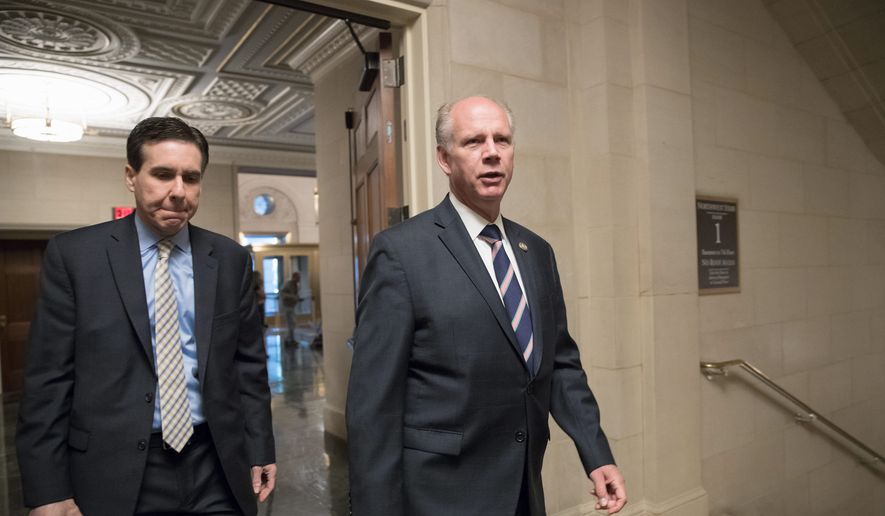With final passage in sight, advocacy groups on both sides in the tax fight are pouring millions of dollars into advertising and pressure campaigns to alternately thank or threaten swing Republicans on Capitol Hill.
American Action Network, a conservative advocacy group friendly to Speaker Paul D. Ryan, on Thursday announced a $2 million TV and digital ad campaign in 24 congressional districts across the country to thank House members who voted for the $1.4 trillion tax-cut package.
The move helps bring the group’s spending plans on pro-tax reform efforts above $24 million now.
“Thank Claudia Tenney — she’s fighting to create jobs — and cut taxes for New York families,” says one ad, referencing a New York Republican House member.
Meanwhile, 45Committee, an outside group supportive of President Trump, on Thursday announced an ad campaign targeting GOP Rep. Dan Donovan of New York, who voted against both the tax overhaul plan last month and a procedural measure to start negotiations with the Senate this week.
“Call Dan Donovan,” text in the ad says. “Tell him to keep his word — vote yes on the tax bill.”
Mr. Donovan and several other New York Republicans have opposed the planned winding down of the state and local tax (SALT) deduction — a move that disproportionately affects middle-to-upper income earners in blue, higher-tax states such as New York, New Jersey, and California.
As part of a compromise, a property tax deduction of up to $10,000 was preserved in both the House and Senate plans, and there’s talk of making more changes in the House-Senate conference committee that will convene to hash out the differences.
But Mr. Donovan and GOP Rep. Peter King of New York have been pushing to preserve the whole break for families earning less than $400,000 per year, while phasing it out for higher-income earners over a number of years.
“Our constituents have to put food on the table and save for their kids’ college tuition just like families in other parts of the country — they shouldn’t foot the bill for everybody else’s tax relief,” Mr. Donovan said.
On the other side of the debate, the liberal advocacy group Not One Penny launched a six-figure TV ad campaign targeting a handful of Republican House members from California who supported the tax package.
“Tell Jeff Denham: stop raising taxes on middle class families,” one ad says.
The GOP tax plan is a giveaway to the rich at the expense of the middle class, said Tim Hogan, a spokesman for the group.
“As the focus once again turns to the House, the Republicans in California’s congressional delegation should stand up for their constituents instead of the GOP’s wealthy donors and corporate interests by voting against this harmful legislation,” Mr. Hogan said.
Republican and Democratic leaders in both the House and the Senate this week named the negotiators to a joint-chamber conference who will work out the differences between the two plans and produce a final, identical product both bodies will need to pass again.
Some Republicans, including President Trump, have said one potential change to a big-ticket item could result in the planned corporate rate cut — from 35 percent to 20 percent in both chambers’ plans — ultimately landing at 22 percent in the final package.
White House press secretary Sarah Sanders said Thursday the focus is on getting the lowest corporate rate possible.
“Fifteen [percent] is better than twenty. Twenty is better than twenty-two. And twenty-two is better than what we have,” Ms. Sanders said.
But House conservatives have already indicated they don’t plan to support a corporate rate higher than 20 percent, and are being joined by some of their colleagues across the Capitol.
“I think the distributional challenges of increasing the corporate rate [are] real — therefore, I am likely to advocate on keeping it where it is,” said Sen. Tim Scott, South Carolina Republican and one of eight Senate GOP conferees for the tax package.
Under fast-track budget rules, the GOP has to stay within a $1.5 trillion cost limit for the plan, which also trims individual tax rates and axes other breaks and exemptions.
Senate Republicans also had the individual rate cuts expire after 2025 in order to comply with the budget rules, so bumping the corporate rate back up a few points could give lawmakers some leeway as they negotiate other tweaks.
But conservative advocacy groups supportive of the tax reform push are also making it clear they want the 20 percent corporate rate enacted.
Lawmakers should “stand firm” and keep the corporate rate at 20 percent, David McIntosh, president of the pro-free market Club for Growth, wrote in a letter to congressional leaders and conferees Thursday.
• David Sherfinski can be reached at dsherfinski@washingtontimes.com.




Please read our comment policy before commenting.